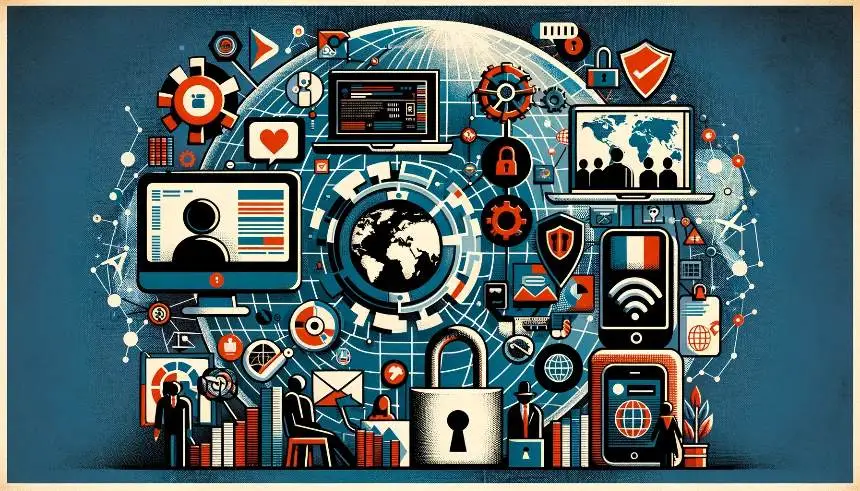Introduction: Navigating the Evolution of Internet Politics
The evolution of internet politics history is as complex as it is transformative, mirroring the broader shifts in how societies interact with and govern digital spaces. This journey, beginning in the mid-1990s in Germany, offers a unique lens through which we can understand the intricate relationship between the Internet and political discourse. Initially perceived as a novel platform for political engagement and information exchange, the Internet rapidly evolved into a critical medium for global communication, governance, and policy-making.
- Introduction: Navigating the Evolution of Internet Politics
- The Emergence of Internet Politics (1995–2003)
- Internet Politics: A Medium of Concern and Regulation (2004–2006)
- The Internet as an Arena for Governance (2007–2016)
- Digital Rights and the Future of Internet Governance (2017–Present)
- Reflecting on the Journey of Internet Politics
This article explores the nuanced ways in which political dialogue and internet governance have co-evolved, each shaping the other in profound ways. From its early days as a tool for democratizing information to its current role as a battleground for digital rights and freedoms, the history of internet politics reflects the dynamic nature of this digital era. By examining these shifts, we gain insights into how technological advancements have not only changed the way we communicate but also how they have redefined the landscape of political power and participation.
This exploration is not just a chronicle of events; it’s an in-depth analysis of the ever-changing semantics of political engagement in the digital realm, illustrating how the Internet has become an integral part of the political fabric of our time.
The Emergence of Internet Politics (1995–2003)
The late 20th century marked a pivotal era in internet politics history, particularly between 1995 and 2003. This period, significant for its technological advancements and political upheavals, witnessed the Internet emerging as a powerful tool in the realm of politics. In Germany, this was a time of exploration and innovation, where the Internet began to be recognized not just as a technological novelty, but as a potent platform for political discourse and mobilization.
Internet has evolved from a novel technological tool to a fundamental component of the global political landscape.
Politicians and governments, keen to harness the communicative power of the Internet, started integrating this new medium into their strategies. It facilitated a new form of engagement with citizens, offering a space for political debates, information dissemination, and, crucially, for the expansion of democratic practices. The Internet’s role in politics was initially seen as an extension of the public sphere, providing an open forum for discussion and participation, unbounded by the traditional limitations of geography and time.
This era also saw the rise of digital activism. Groups and individuals found in the Internet a means to voice their concerns, mobilize support, and challenge political norms. The democratizing potential of the Internet was particularly evident during political campaigns and grassroots movements, where it enabled a level of participation and engagement previously unattainable.
However, alongside these positive developments, the early 2000s also highlighted some of the challenges and pitfalls of digital politics. Issues such as digital divide, information overload, and the reliability of online information began to surface, raising questions about the efficacy and equity of the Internet as a political tool. These concerns laid the groundwork for the subsequent phases of internet politics history, where the focus shifted from the opportunities presented by the Internet to the complexities and responsibilities that come with its widespread use.
This phase of internet politics history was instrumental in setting the stage for the Internet’s later roles. It demonstrated the potential of digital technology in reshaping political engagement, while also hinting at the challenges that would become more pronounced in the years to come.
Internet Politics: A Medium of Concern and Regulation (2004–2006)
In the subsequent chapter of internet politics history, spanning from 2004 to 2006, the narrative surrounding the Internet underwent a significant shift. During this period, the focus turned from the Internet as a tool for political empowerment to its role as a medium of concern, particularly in the context of global security.
The aftermath of the 9/11 attacks played a crucial role in reshaping the perception of the Internet. It began to be seen not only as a platform for free expression and democratic engagement but also as a potential tool for terrorist groups. This change in perspective marked a turning point in internet politics, as governments worldwide started to pay closer attention to the Internet’s role in national and global security.
A key takeaway from this history is the ever-present need for balance in Internet governance—balancing security with freedom, regulation with innovation, and the rights of individuals with the interests of the collective.
In Germany, this period was characterized by heightened vigilance and a push for stricter internet regulations. The government, along with various international bodies, started to develop policies aimed at combating the use of the Internet for extremist purposes. This led to intense debates over the balance between security and freedom on the Internet, raising questions about censorship, surveillance, and privacy.
The discourse around the Internet also began to reflect concerns about its unregulated nature. Policymakers, media, and the public grappled with issues such as cyberbullying, misinformation, and the digital divide. These discussions highlighted the need for more comprehensive governance structures to ensure the Internet remained a safe and equitable space for all users.
This phase of internet politics history was marked by a growing awareness of the complexities associated with governing a rapidly evolving digital landscape. The Internet was no longer just a platform for political discourse; it had become a critical area of concern that required careful consideration and regulation. This period set the stage for the subsequent era, where the Internet would emerge as a central object of governance and policy-making.
The Internet as an Arena for Governance (2007–2016)
Between 2007 and 2016, internet politics history entered a new phase, characterized by the Internet’s transformation into a central arena for governance and policy-making. This era, crucial in the digital narrative, saw a shift from viewing the Internet merely as a communication tool or a security concern to recognizing it as a vital component in the global governance landscape.
In Germany, as in many other countries, this period was marked by intense policy debates and legislative initiatives aimed at addressing the various challenges posed by the rapidly evolving digital world. The focus was on establishing frameworks to govern the Internet in a way that balanced the needs for security, privacy, and freedom of expression. This shift was in response to the growing understanding of the Internet’s impact on almost every aspect of society and politics.
One of the central issues during this time was data privacy. The rise of social media platforms and the increasing digitization of personal information led to significant concerns about how this data was being used and protected. This resulted in the implementation of stricter data protection laws and regulations, both at the national and European Union levels, reshaping the landscape of digital rights and privacy.
Another key aspect of this era was the debate over Internet censorship and surveillance. The revelations of extensive online monitoring by governments and agencies sparked global discussions about the balance between national security and individual privacy rights. These debates brought to light the complexities of governing the digital space, where the lines between security, privacy, and freedom are often blurred.
This period in internet politics history was pivotal in shaping the current understanding of the Internet as a governance space. It highlighted the need for robust, flexible policies that could adapt to the fast-paced changes of the digital world, ensuring that the Internet remains a free, secure, and equitable platform for all. This era set the foundation for the ongoing discussions about the role of the Internet in society and its governance in the future.
Digital Rights and the Future of Internet Governance (2017–Present)
As internet politics history progresses into the current era, starting from 2017, the focus increasingly shifts towards digital rights and the evolving landscape of Internet governance. This period is defined by a heightened awareness of the Internet’s role in shaping societal norms, influencing political processes, and its impact on human rights.
The ongoing debate about digital rights has become central in discussions around Internet governance. Issues like net neutrality, freedom of expression online, and protection against cybercrimes have taken precedence. In Germany and globally, these concerns have led to the development of policies and laws that aim to protect users’ rights on the Internet while ensuring a free and open digital space.
Another critical aspect of this era is the role of big tech companies in internet politics. The influence of these corporations on information dissemination, privacy, and public opinion has raised significant questions about corporate responsibility and regulatory oversight. Governments and international organizations are grappling with how to regulate these entities effectively, ensuring they contribute positively to the digital ecosystem without compromising user rights and freedoms.
This period has also seen a rise in the use of the Internet as a tool for political mobilization and activism. Social media platforms, in particular, have played a pivotal role in organizing protests, spreading awareness about social issues, and influencing political campaigns. This highlights the Internet’s power as a platform for civic engagement and its potential to impact real-world change.
As we look towards the future, the challenges and opportunities in internet politics continue to evolve. The ongoing dialogue around digital rights, governance, and the role of technology in society is more crucial than ever. This era in internet politics history underscores the need for adaptive, inclusive, and forward-thinking policies that can keep pace with the rapid advancements of the digital age, ensuring that the Internet remains a tool for empowerment and positive change.
Reflecting on the Journey of Internet Politics
As we reflect on the journey of internet politics history, it becomes evident that the Internet has evolved from a novel technological tool to a fundamental component of the global political landscape. This evolution, particularly highlighted in the context of Germany but resonant worldwide, illustrates the profound impact the Internet has had on governance, policy-making, and human rights.
The various phases of internet politics, from its early use as a platform for political communication to its current role in governance and digital rights advocacy, demonstrate the dynamic and multifaceted nature of the Internet. Each era brought with it new challenges and opportunities, shaping the way we understand and interact with the digital world.
A key takeaway from this history is the ever-present need for balance in Internet governance—balancing security with freedom, regulation with innovation, and the rights of individuals with the interests of the collective. As the Internet continues to permeate every aspect of our lives, the decisions made about its governance will have far-reaching implications for society and politics.
Looking forward, the ongoing discussion about digital rights and the role of technology in society is crucial. It is imperative that policies and regulations keep pace with technological advancements, ensuring that the Internet remains a space for free expression, innovation, and democratic engagement.
In conclusion, the history of internet politics is not just a story of technological advancement; it is a narrative about the continuous interplay between technology and society. As we navigate the complexities of the digital age, the lessons learned from this history will be invaluable in guiding us towards a more equitable, secure, and open Internet for future generations.
Adapted from an academic article for a wider audience, under license CC BY 4.0









